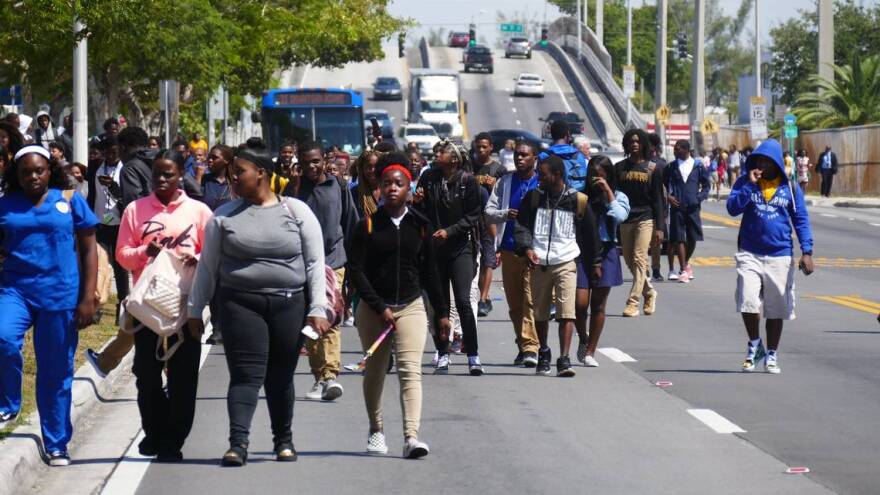Kimson Green, a sophomore at Northwestern Senior High School about to be inducted into the National Honor Society, was shot and killed on Sunday, April 7. According to police, gunfire erupted while Green was talking with friends in front of an apartment building in Liberty City.
On Tuesday, hundreds of Northwestern students walked out and marched to protest gun violence. Teachers and staff joined as they walked through the housing project where the shooting happened.
Read More: Miami Northwestern Students Walk Out In Memory Of Slain Classmate
It’s the latest case of school protests over gun violence – except it has happened in a neighborhood that has frequently experienced that violence a lot. Still, it represents the renewed energy of student activism that has defined the aftermath of the Parkland shooting.
On this week’s The Florida Roundup, WLRN’s Tom Hudson hosts a panel of station reporters, including Jessica Bakeman, Nadege Green and Caitie Switalski. They discuss the different responses to these acts of violence and how they're setting the stage for school safety initiatives.
WLRN: How are students processing this tragedy?
NADEGE GREEN: The students at Northwestern are smart. Even when I went to school there, we often joke that you get this unofficial teaching in blackness. Going to Northwestern, we're not just learning about academics, but we're also learning about inequality. People are going to view you in a certain way. They are going to have preconceived notions about who you are based on the school that you go to.
And so many of the students said outright, look at Marjory Stoneman Douglas High School and how people respond to the students there. This is not the first time students at Northwestern have raised their voices about gun violence. I know this because I've gone to community meetings and I've seen students talk at community meetings. Some students have addressed our local politicians before. This is not new.
You held a forum with students and faculty there.
N.G.: I held a forum about gun violence two years ago. We've also seen elementary school kids take to the streets in Liberty City in protest for the right to play outside safely. So, this idea of before and after Parkland, I turn that at the media as well because the reason we are paying attention to what's happening in Parkland is because the media is covering it. We have to be completely honest. We do not cover Liberty City in a way that often centers the humanity of what is happening there. It is typically just a crime story and that is it. We don't consider trauma. We don't consider what this means to live it.
And the media writ large is committing that same kind of coverage this time around – perhaps more coverage – to these two tragic murders and the two people injured because it is happening after Parkland and through that lens.
N.G.: Also here's the difference: Parkland was a mass shooting on a school campus. The everyday gun violence that we see in our community is not deemed remarkable enough to garner coverage. So oftentimes – and I say that not to say that it isn't remarkable – but we have normalized the abnormal that one person getting shot is no longer shocking. The shootings that you would see covered typically are when eight people get shot. Or when the youngest of the youngest get shot, you see a lot of media attention to that because that is remarkable.
Is it beginning to evolve change at all because of Parkland? I mean as distasteful as it is to talk about before and after Parkland, the fact is it has changed the conversation.
N.G.: I think that remains to be seen. One of the things that I've noted as a journalist, as a member of the community, is even who do the politicians and the faces on TV show up for at the funerals. You will see them at the funeral of a 6-year-old; you will see them at the funeral of an 8-year-old. I talk to parents of murdered children all the time, and they say, "How come the mayor didn't come to the funeral of my 16-year-old boy? How come this public official didn't come to the funeral of my 18-year-old?" Because we have a hierarchy of victims - of which victims get more attention or more empathy.
This post was updated.



